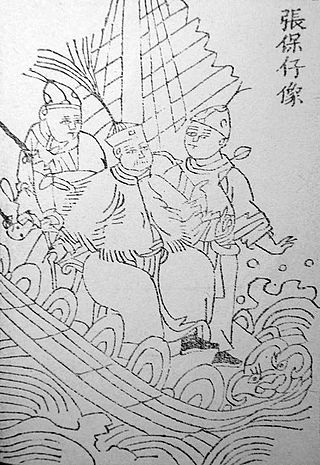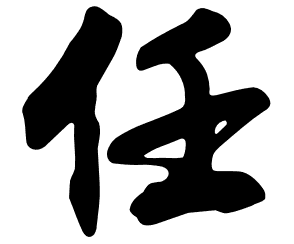Places
- Linfeng, Chongqing, a town in China
Lin Feng may refer to:

Lei Feng was a soldier in the People's Liberation Army who was the object of several major campaigns in China. The most well-known of these campaigns in 1963 promoted the slogan "Follow the examples of Comrade Lei Feng." Lei was portrayed as a model citizen, and the masses were encouraged to emulate his selflessness, modesty, and devotion to Mao Zedong. After Mao's death, state media continued to promote Lei Feng as a model of earnestness and service, and his image still appears in popular forms such as on T-shirts and memorabilia.

Lin Yang-kang was a Taiwanese politician. He was born at Sun Moon Lake during the Japanese rule of Taiwan. Some thought he might be Chiang Ching-kuo's successor as head of the Kuomintang (KMT), but after failing to win the KMT's nomination for president in 1996, he became an independent. Lin rejoined the party in 2005, and died in 2013.

Zheng is a Chinese surname. It is the 7th name on the Hundred Family Surnames poem. In 2006, Zheng ranked 21st in China's list of top 100 most common surnames. Zheng belongs to the second major group of ten surnames which makes up more than 10% of the Chinese population. Zheng was a major surname of the rich and powerful during China's Tang dynasty.

Cheung Po Tsai was a navy colonel of the Qing dynasty and a former pirate. "Cheung Po Tsai" literally means "Cheung Po the Kid". He was known to the Portuguese Navy as Quan Apon Chay during the Battle of the Tiger's Mouth.

Féng is a Chinese surname. It is 9th in the Song Dynasty Hundred Family Surname poem and is reported as the 31st most common Chinese last name in 2006. Unlike the less common Feng surname 鳳 it is a rising second tone féng in modern Mandarin Chinese.

Lin is the Mandarin romanization of the Chinese surname written 林, which has many variations depending on the language and is also used in Taiwan, Singapore, Malaysia, Philippines, Indonesia, Japan, Korea, Myanmar, Vietnam, Thailand, Cambodia.

China is a major chess power, with the women's team winning silver medals at the Olympiad in 2010, 2012, and 2014; the men's team winning gold at the 2014 Olympiad, and the average rating for the country's top ten players third in the FIDE rankings as of April 2023.

Ding is a Chinese family name. It consists of only 2 strokes. The only two characters that have fewer strokes are "一" and "乙".

Limahong, Lim Hong, or Lin Feng, well known as Ah Hong or Lim-A-Hong or Limahon, was a Chinese pirate and warlord who invaded the northern Philippines in 1574. He built up a reputation for his constant raids to ports in Guangdong, Fujian and southern China. He is noted to have twice attempted, and failed, to invade the Spanish city of Manila in 1574.

Ruan is a Chinese surname.

The Chinese Chess Association (CCA) (中国国际象棋协会) is the governing body of chess in China, one of the federations of FIDE, and a member of the Asian Chess Federation (ACF). It is the principal authority over all chess events in China, including the China Chess League (CCL). Founded in 1986, the CCA is headquartered in Beijing.

You Deserved to Be Single or Huogai Ni Danshen is a 2010 Chinese film directed by Chinese female director Cai Xin who co-wrote the screenplay also. It stars Taiwanese actress Ruby Lin, Chinese actress Gao Fei, Taiwanese actor Mike He and Taiwanese-American actor David Wu. Special guest casts include China pop group "Shuimu Nianhua" member Luke(Lu Gengxu), Hong Kong actress Angie Chiu and so on. It received mixed reviews with critics focusing on their praise on actor Mike He and Ruby Lin.

Tián, or T'ien in Wade-Giles is a Chinese surname. An alternative transliteration of "田" from Cantonese is Tin, from Hokkien is Thinn. It appeared in the Hundred Family Surnames text from the early Song dynasty. It also means "field". In 2019 it was the 34th most common surname in mainland China.
The Presidium of the National People's Congress is the presiding body of the National People's Congress when it is in session.
Jū is a Chinese family name.

Rén is the Mandarin pinyin romanisation of the Chinese surname written 任 in Chinese script. It is romanised as Jen in Wade–Giles, and Yam or Yum in Cantonese. It is listed 58th in the Song dynasty classic text Hundred Family Surnames. As of 2008, it is the 59th most common surname in China, shared by 4.2 million people. In 2019 it was the 49th most common surname in Mainland China.

Xu is a Chinese surname. In the Wade-Giles system of romanization, it is romanized as Hsu, which is commonly used in Taiwan.
The year 2017 is the 14th year in the history of the Wu Lin Feng, a Chinese kickboxing promotion. Events are broadcast on Henan Television every Saturday 21:15.
Events from the year 2018 in Taiwan, Republic of China. This year is numbered Minguo 107 according to the official Republic of China calendar.
The following lists events that happened during 2019 in China.